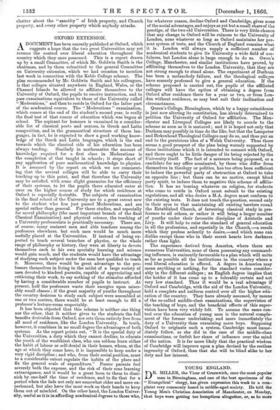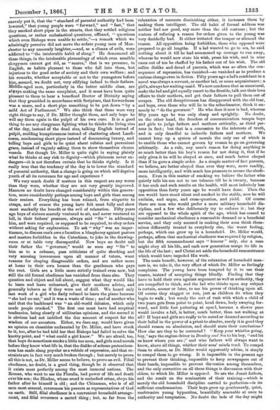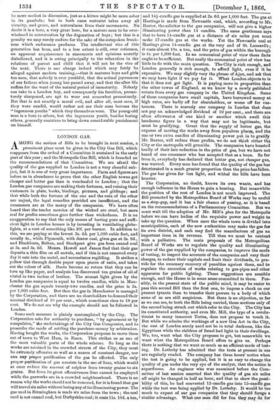YOUNG ENGLAND.
TAR. MIlLER, the Vicar of Greenwich, once the most popular LI man in Birmingham, and one of the best specimens of the " Evangelical " clergy, has given expression this week to a com- plaint very commonly heard in middle-aged society. He told the Young Men's Christian Association of Manchester, on Monday, that boys were getting too bumptious altogether, or, as be more
suavely pat it, that the "standard of parental authority had been lowered," that young people were "forward," and "fast," that they smoked short pipes in the streets, that they settled religious questions, or rather ecclesiastical questions, offhand, "questions which even Bishops were unable to settle,"—a remark which we admiringly perceive did not move the sedate young men of Man- chester to any unseemly laughter,—and, as a climax of evils, were addicted to "the intolerable habit of slang." He denounced all these things, in the intolerable phraseology of which even sensible clergymen cannot get rid, as "snares," that is we presume, in English, as habits pleasant to those who fall into them, but injurious to the good order of society and their own welfare ; and his remarks, whether acceptable or not to the youngsters before him, seemed, we doubt not, very edifying indeed to their fathers. Middle-aged men, particularly in the better middle class, are aliyays making the same complaint, and it must have been quite pleasant to them to hear a beneficed Doctor of Divinity saying that they grumbled in accordance with Scripture, that forwardness was a snare, and a short pipe something to be put down "by a mild Act of Parliament." We also think that these were very right things to say, if Dr. Miller thought them, and only hope he will say them again in the pulpit of his own cure. It is a good thing to see any clergyman fighting what he thinks the living sins of the day, instead of the dead sins, talking English instead of pulpit, scolding bumptiousness instead of chattering about Laodi- ceans, condemning short pipes instead of denouncing luxury, and telling boys and girls to be quiet about rubrics and prevenient grace, instead of vaguely asking them to show themselves chosen vessels. But though Dr. Miller is quite right in saying plainly what he thinks at any risk to dignity—which plainness never en- dangers—it is not therefore certain that he thinks rightly. Is it really true that the tendency of the day is to lower the standard of parental authority, that a change is going on which will deprive youth of all its reverence for age and experience ?
We very much doubt if matters in this respect are any worse than they were, whether they are not very greatly improved. Manners no doubt have changed considerably within this genera- tion, more considerably perhaps among boys and girls than among their seniors. Everything has been relaxed, from etiquette to straps, and of course the young have felt most fully and show most markedly the benefit or the evil of relaxation. Fifty years ago boys of sixteen scarcely ventured to sit, and never ventured to loll, in their fathers' presence, always said " Sir" in addressing him, and were required, or supposed to be required, to obey orders without asking for explanation. To ask " why " was an imper- tinence, to discuss one's own education a blasphemy against pastors and masters forbidden in the Catechism, to joke in the drawing- room or at table very disrespectful. Now boys no doubt call their father the "governor," would as soon say " Sir " to him as to a cabman, pass criticisms of quite shocking and very amusing irreverence upon all manner of tutors, want reasons for obeying disagreeable orders, and are rather more at home in their own houses than the gentleman who pays the rent. Girls are a little more strictly trained even now, but still the old formal obedience has vanished from them also. They question and object and loll about, suggest what they would like to learn and leave unlearned, give their mothers advice, and generally behave as if they were out of drill. We heard only last week of a girl who flatly refused to learn the piano because "she had no ear," and it was a waste of time ; and of another who said that the backboard was "an old-world delusion, which only made people crooked." The first one must have had sceptical tendencies, being clearly of utilitarian opinions, and the second it is obvious had not imbibed the due amount of respect for the wisdom of our ancestors. Either, we dare say, would have given an opinion on chasubles undaunted by Dr. Miller, and have stuck to it, too, after he had told her that Bishops had failed to solve the knotty point, and "what could a girl know." We are afraid, too, that boys do sometimes smoke a little too soon, and girls read novels
before they know what life is, that the dislike of solemn pretentious- ness has made slang popular as a vehicle of expression, and that re- straints are in fact very much broken through ; but merely to prove
all this is not, as Dr. Miller seems to believe, to prove an evil. Filial obedience, no doubt, is a good thing, though be it observed that
it exists most perfectly among the most immoral nations. The Roman, who went to see the Floralia, had power of life and death over his son; the Hindoo, whose creed is embodied crime, obeys his
father after he himself is old ; and the Chinaman, who is of all men most sensual, reverences his parents as representatives of God on earth. Still, filial obedience is a convenient household arrange- ment, and filial reverence a sacred thi g; but, so far from the relaxation of manners diminishing either, it increases them by making them intelligent. The old habit of formal address was neither bad nor good, any more than the old costume ; but the custom of refusing a reason for orders given to the young was very decidedly bad. It either irritated the temper or silenced the reason. All opposition being forbidden, those who opposed were prepared to go all lengths. If a lad wanted to go to sea, he said nothing about it till he had summoned up courage to run away, whereas he would now state his wish, press his wish, and in nine. cases out of ten be chaffed by his father out of his wish. The old. sullen dislike and dread of parents, which was so often the con- sequence of repression, has vanished—so vanished as to produce a curious change even in fiction. Fifty years ago a lad's confidant in a novel was always a servant, or another lad, or some acquaintance ; a girl's, always her waiting-maid. We now condemn that as unnatural, make the lad and girl equally resort to the fireside, talk out their love affairs to their mothers, and get their fathers to pull them out of scrapes. The old deceptiveness has disappeared with the old fear, and boys, even those who will lie to the schoolmaster, think it un- manly to "do the governor." He who does it now is bad, whereas fifty years ago he was only sharp and sprightly. No doubt, on the other hand, the freedom of communication tempts boys and girls to judge fathers and mothers critically, as third per- sons in fact ; but that is a concession to the interests of truth, and is only dreadful to imbecile fathers and mothers. We cannot keep up a system of morals the only use of which is to enable those who cannot govern by reason to go on governing arbitrarily. As a rule, any man's reason for doing anything is so much better than his boy's reason for not doing it, that if he only gives it he will be obeyed at once, and much better obeyed than if he gave a simple order. As a simple matter of fact parents,. we believe, are better obeyed than ever they were, more readily,. more intelligently, and with much less pressure to secure the obedi- ence. Even in this matter of smoking we believe the father who. quietly tells his son not to use tobacco till he is twenty, because it has such and such results on the health, will meet infinitely less opposition than forty years ago he would have done. Then the son would have stood silent and smoked in the stable, now he will exclaim, and argue, and cross-question, and yield. Of course. there are men who would prefer a more military household dis- cipline, and a few who deliberately try to enforce it ; but they are opposed to the whole spirit of the age, which has ceased to consider mechanical obedience a reasonable demand or a beneficial service, and they only succeed in making their sons think them-
selves differently treated to everybody else, the worst feeling, perhaps, which can grow up in a household. Dr. Miller would,
perhaps, affirm that mechanical obedience was required by religion, but the fifth commandment says " honour " only, else a man might obey all his life, and each new generation merge its life in the life of the last ; and Christ set aside the household remonstrance, which would have impeded His work.
The main benefit, however, of the relaxation of household man-. ners is, we take it, the very effect of which Dr. Miller so feelingly complains. The young have been tempted by it to use their reason, instead of accepting things blindly. Finding that they have to hold their own against argument as well as authority, they are compelled to think, and the lad who thinks upon any subject is certain, sooner or later, to use his power of thinking upon all. Of course they stagger or run, just as children do when they begin to walk ; but surely the sort of rush with which a child of two years gets from point to point, head down, body swaying for- ward, and little feet pattering at speed, because a slower pace would involve a fall, is better, much better, than not walking at all? If boys and girls are really to be saved or damned according to their belief in the power of a priest to absolve, surely it is good they
should reason on absolution, and should state their conclusions? How else are they to be corrected? "Keep your whistles going, boy," says the engine-driver in Dombey and Son to his boy, "and let
us know where you are ;" and wise fathers will always want to know, above all things, whither their sons' minds tend. To compel them to silence, as Dr. Miller would apparently advise, is simply to compel them to go wrong. It is impossible in the present age to prevent their thinking, impossible to keep newspapers out of their hands, impossible to prevent discussion among themselves, and the only corrective on all these things is discussion with their elders, to which Dr. Miller is opposed. So are the Jesuit fathers, and the result on the seminarists of their training—which is merely the old household discipline carried to perfection—is its sufficient condemnation. Their, boys grow up gentlemanly, quiet,
unobtrusive young hypocrites, beautifully amenable at once to authority and temptation. No doubt the lads of the day might
be more modest in discussion, just as a kitten might be more sober in its gambols ; but in both cases restraint takes away all vivacity, and grace, and naturalness from their movements. No doubt it is a bore, a very great bore, for a mature man to be over- whelmed in eonversation by the dogmatism of boys ; but that is a penalty we may surely endure for the sake of the outspoken frank- ness which endurance produces. The intellectual vice of this generation has been, and to a less extent is still, over reticence, an apparent acquiescence in statements and opinions secretly disbelieved, and it is owing principally to the relaxation in the relations of parent and child that it will not be the vice of the next. There is one charge indeed which may fairly be alleged against modern training,—that it matures boys and girls too soon, that nobody is ever youthful, that the animal joyousness of our fathers when young has passed away, and that the after life suffers for the want of the natural period of immaturity. Nobody can take in a London boy, and consequently his faculties, prema- turely sharpened, are apt to wear out somewhat prematurely. But that is not exactly a moral evil, and after all, most men, if they were candid, would rather not see their sons become the "ingenious youths" which they themselves were. The young-old man is a bore to others, but the ingenuous youth, besides boring others, generally contrives to bring down considerable punishment on himself.
































 Previous page
Previous page